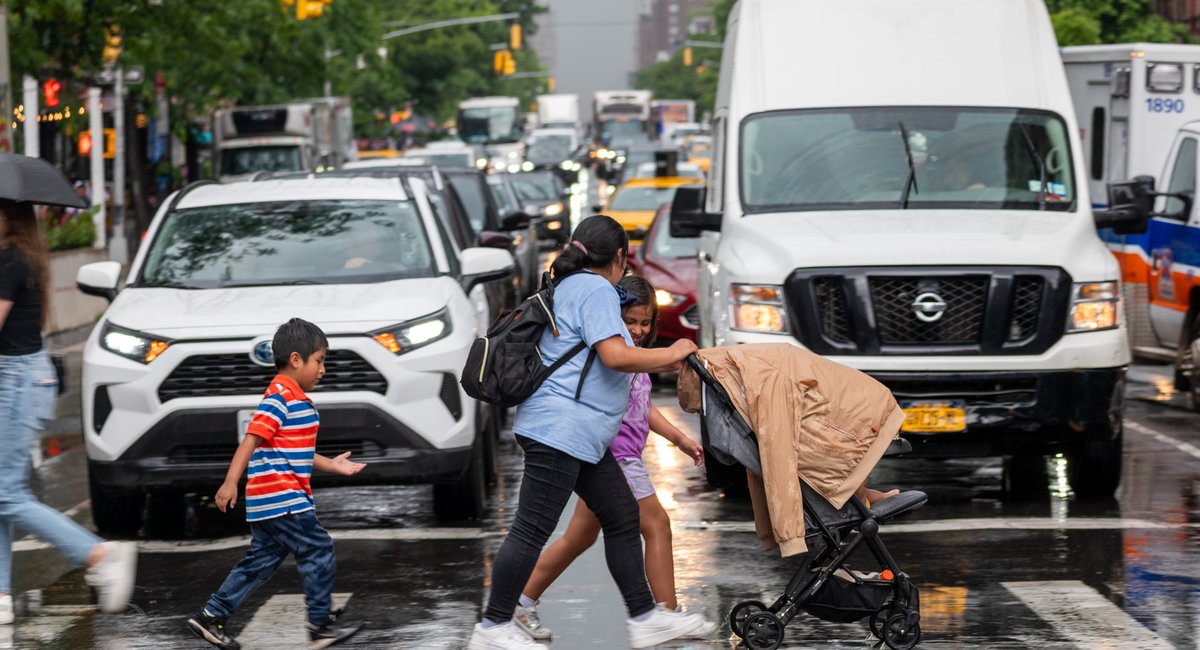As the MTA’s congestion pricing scheme remains in limbo, state officials are mulling a simple question about the price of the Manhattan tolls: how low can they go?
Since Gov. Kathy Hochul slammed the brakes on the program in June, she’s said the $15 base charge approved by the MTA “was too much for New Yorkers at this time.”
MTA officials arrived at the price after years of research and an exhaustive federal review process. The figure also complies with a 2019 state law that requires congestion pricing to bring in $1 billion a year for the MTA’s construction department. But experts warned that amending the fee structure could reboot a bureaucratic process that might kill any chance that the tolls will launch in the near future.
Michael Gerrard, a Columbia Law School professor and director of the Sabin Center for Climate Change Law, said Hochul would have a relatively straightforward path if she dropped the base fare to $9, because the MTA previously studied that price as part of the program’s environmental review. Any price lower than that could lead to major speed bumps.
“If it went below $9, there’d be additional analysis they would have to do,” said Gerrard, who is helping coordinate a pair of lawsuits filed by advocates that aim to force Hochul to launch the tolls. “They would have to do more computer runs and scenario analysis.”
Michael Bennon, a researcher at Stanford’s Center for Democracy Development and the Rule of Law, said changing the toll rate could also prompt delays in court. He said the New Jersey federal judge overseeing a lawsuit filed by Gov. Phil Murphy that calls for a more thorough review of the tolls could require the MTA to restart its environmental analysis.
“If the prices for tolling or the tolling scheme changes materially, the folks that are litigating against the project are going to claim that the environmental assessment needs to be updated and it’s going to go before a judge,” Bennon said.
The MTA worked on its previous environmental review of the tolls for more than two years before it was approved by federal regulators.
It’s not clear what number the governor thinks would be politically palatable or how long a new analysis might take. In defending the congestion pricing pause, Hochul’s office has pointed to a Siena College poll from August that estimated 59% of likely voters in New York state felt congestion pricing “should be permanently scrapped.”
Hochul has said London only charged £5 when it launched its own congestion pricing tolls in 2003. But converted into dollars and adjusted for inflation, that price comes out to just over $14 in 2024 dollars.
Still, any change to the toll that avoids another yearslong review process would come with its own headaches. If the MTA lowered the base rate while still bringing in $1 billion a year, it would likely be forced to raise the tolls for trucks and taxis — and nix some discounts the agency approved for drivers that cross at one of the Lower Manhattan tolling zone crossings.
Hochul could push through an amendment to the congestion pricing law that nixes the $1 billion a year mandate in next year’s state budget, which would allow the MTA to lower the $15 price without cutting any toll exemptions or hiking the rates for trucks and taxis. But she’d also be tasked with finding a separate source of funding to fill the difference.
Hochul spokesperson John Lindsay didn’t comment on the governor’s deliberations, but pointed to a statement from June where she claimed her record “should provide the MTA with full confidence in future funding streams.”
Rachael Fauss, an analyst at the good government group Reinvent Albany, said the Legislature has no reason to help Hochul make changes to congestion pricing.
“The Legislature does not need to get involved, actually,” said Fauss. “And if you’re asking them to, I think you’re asking them to go out on a limb on congestion pricing in a way that may be more politically difficult for them.”
“The state just can’t come up with enough money without congestion pricing,” she added.
Gerrard said there might not be time to wait for the Legislature to agree on a plan. He said if former President Donald Trump is elected and takes the White House on Jan. 20, he could order further delays to the tolls. (Trump has vowed to kill congestion pricing during “his first week in office.”)
If that happens, “it could take years” for congestion pricing to have another chance of launching, Gerrard said.
